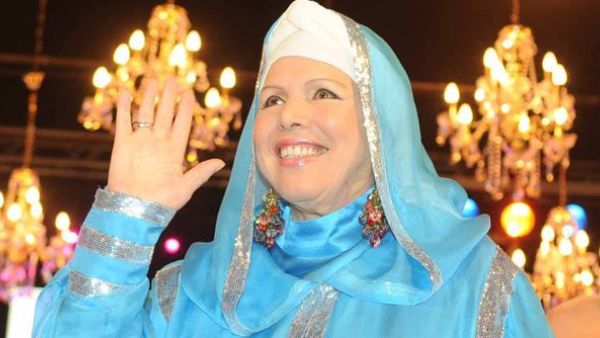Tunisian artist Naama, considered the queen of Tunisian pop music, died on Sunday at the age of 86, after a long struggle with illness and an artistic career of nearly four decades.
The Tunisian culture ministry mourned the late artist in a post on its official Facebook page and paid tribute to the various stages of her artistic career.
Many Tunisian intellectuals and artists also mourned her, including Tunisian TV and film star Hend Sabry, who tweeted, “Today, one of the icons of Tunisian and Arab art scene has departed, the one described by the great Egyptian writer Youssef Idriss as ‘Tunisia’s First Artist’.. . Tunisian music is today orphaned.”
Naama, who started singing at the age of 11, has been one of the most prominent artists in Tunisia since the middle of the last century. Her real name is Halima Echeikh.
Naama had a rich artistic career before she became the most famous Tunisian female singer. For decades, she participated in the biggest Tunisian and Arab festivals and events. She also brought joy to Tunisians with her memorable songs in parties and celebrations.
After entertaining small audiences in private parties, Naama sang in public for the first time at a charity event for the Association of the Blind, alongside other famous singer Oulaya.
After that, she joined the Rachidia Institute, the most prestigious musical institution in Tunisia, from which generations of the country’s artists graduated, and later became one of the permanent singers of the Rachidia Troupe. It was Tunisian master composer Salah El Mahdi who gave her the name “Naama” (meaning “blessing” in Arabic) and composed a number of sentimental songs for her, including “Eddounya haniya” and “lil ah ya lil.” Tunisian artist Khemaies Ternan also composed some of her famous songs, such as “Mahleha kilma fi fommi” and “Chara’a el Hob.”
Tunisian radio used to broadcast live concerts from the Rachidia Institute the artist performed every every two weeks.
As she grew in popularity, Naama was named official singer on national radio after 1958 alongside a group of Tunisian top artists including Saliha and Oulaya.
The artist participated with the Tunisian Radio troupe in concerts outside the country, including the Miss Arab Festival in Beirut in 1966 and the Cairo Millennium Festival in 1969, after which she was given the title of “Tunisia’s first artist.” She also performed in many European capitals.
Naama was known for her loyalty to the Tunisian art scene and her fans at home. Unlike many artists of her time, she did not emigrate to Egypt.
Naama performed on stage and in radio and TV for 40 years until her retirement in 1998 due to health problems.
She left a legacy of 360 songs composed by leading Tunisian artists such as Khemaies Ternan, Mohamed Triki, Saleh El Mahdi, Qaddour Srarfi and Abdelhamid Sassi. She also had songs composed by Sayed Makkawi and Youssef Shawky from Egypt and Hassan Al-Oreibi, Salam Qadri and Kadhim Nadim from Libya.
Naama’s last brief artistic appearance on stage was in 2014 during a tribute to the Tunis Municipal Theatre. She performed there her famous song “Ellila eid” (Tonight we celebrate), which has become a national song for the celebration of any happy event.
The artist then appeared publicly in the summer of 2019 at a ceremony held in her honour by the International Hammamet Festival.
The public sang her songs, swayed to her tunes, clapped and interrupted her repeatedly to express their love for the artist, who repeated some of the words of her memorable songs.
“My inexhaustible wealth is, the love of the public. Attending this ceremony is the greatest crowning,” Naama said during the event. “Immortality comes from honesty and sincerity in words and in performance,” she added.
This article has been adapted from its original source.








